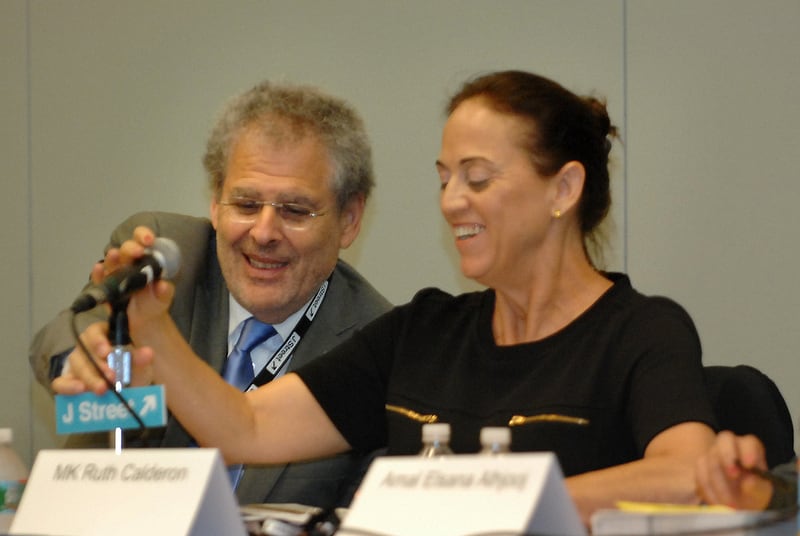Last Sunday, at the J Street Conference, I participated in a panel on “How Israel Can Represent All Its Citizens While Staying True to Its Jewish Character.” My interlocutors were Amal Elsana Alhjooj and Ruth Calderon. I decided to speak extemporaneously rather than deliver what I prepared. The latter appears below.
Should Israel be a state of its citizens or a Jewish state? We often hear this question. We also hear, even in the written promotional materials for this J Street session, that a Jewish state might aspire to be “a light unto the nations.” Perhaps we should just learn from the nations for a change.

Israel, it is said, is a nation-state, legally, in fact, the “Jewish and democratic state,” a phrase adopted in the Basic Law of Human Dignity, whose meaning is hardly self-evident. The first formal expression implying “Jewish and democratic” was in the Biltmore Program of May, 1942, calling for a “Jewish Commonwealth integrated in the structure of the new democratic world.” The UN Partition Resolution of 1947 called for a Jewish state and Arab state, including strict democratic protections for minorities in each state. It also called for an economic union, but never mind.
For most Israelis and American Jews, the “Jewish” part of the phrase “Jewish and democratic” implies many things, which don’t necessarily work together: a Jewish majority, political representation for world Jewry, the incorporation of Jewish law into civil affairs, an historical attachment to the land of Israel, which is magically transformed into an "historic right," whatever that is.
Ask Israelis on the street and most will just default to the idea that a Jewish majority justifies privileges for Jews, individually as well as collectively, though nobody who voted for Biltmore thought a “Jewish Commonwealth integrated in the structure of the new democratic world” meant that the Jewish state would give privileges to exclusively to individual citizens, legally designated as Jewish owing to rabbinic decree or J positive blood.
Yes, the Zionists who mattered at the time of Biltmore may have anticipated something like the Law of Return, a peculiar necessity in its time, which adopted the principle that anyone Nazis would have hunted according to the Nuremberg Laws would be welcome. But Zionists mostly took for granted that Israel would be a Jewish state in the sense that it would be place of Hebrew culture, what Ahad Haam had called the "Hebrew national atmosphere." When Yediot Aharonot put a headline on its story celebrating the UN partition resolution of 1947, it read Kama Medina Ivrit: “the Hebrew state rises.”
Alas, things did not work out as planned. For reasons too familiar to repeat here—reasons largely having to do with implementing the Law of Return in conjunction with the Jewish Agency—the Jewish state apparatus came to recognize two forms of legal status: citizenship and nationality. Israeli citizenship entitled you to civil privileges: equality before the law in courts of law, the right to vote, etc. Jewish nationality entitled you to exclusive material privileges, privileged access to state controlled lands, housing in Jewish settlements, optional state-sponsored orthodox education, national service, a burden, to be sure, but also, in a small economy, an important career move. Jewish nationality also made you subject to the ministrations of a state-sponsored national-orthodox rabbinate overseeing marriage, burial, and divorce.
What makes you a citizen as opposed to being a Jewish national? Again, Israel’s legal strictures are too convoluted to go through here. Suffice it to say that nationality has depended on exclusive notions of Halachic commitment and/or achieving the right bloodlines:
If you are born to a Jewish mother, then you are, by law, a Jewish national and a citizen. You are also a Jewish national, and subject to immediate citizenship, if you are an immigrant who has not renounced the Jewish faith and are descended from at least one Jewish grandparent. If you are born in Israel to a Jewish father only, then you are a citizen—but can only become a Jewish national by sincerely converting to Judaism, usually according to orthodox standards. A non-Jew can also become a Jewish national by converting, like the child born in Israel to a non-Jewish mother, but unlike that child, cannot be a citizen without converting.
Arabs and other nationalities born in Israel to a mother and father who are citizens are also citizens. But if only one parent is a citizen, and the other is from Jordan, say, the child may not be accepted as a citizen. Arabs born outside the country, and who may want to immigrate, say, to marry and Arab citizen, may do so in rare cases, but are unlikely to be granted citizenship. Then again, if you live in Israel long enough, and petition the interior ministry persistently enough, the ministry can make you a citizen. Clear?
All of which raises the real question the term “Jewish and democratic” begs: not what a Jew is, but what a democratic state is. If we were clearer about the latter, we might not be so tortured about the former. And here is where Israel can learn much from other states that have struggled with reconciling nationality with democracy, states like Canada, or states of the European Union.
A person, Kant tells us, is crooked timber from which no straight thing can be made. Why then expect straightforward laws of citizenship? Because a democratic state is not a person. Neither is it a super-sized family or congregation. It does not claim to embody any particular values, save for the value of providing its citizens the room to compete in establishing values. It should certainly not aspire to define its citizens in terms of a singular national identity the way people do, or at least the way teen-agers think they do.
On the contrary, a democratic state, including Israel, should provide its crooked timber—its individual citizens and voluntary groups—the means to pursue their lives according to their consciences. A democratic state has no business telling you whom or how to love, what is beauty, or how to conceive of the divine. It cannot declare a book as sacred. It can only declare the right to interpret books as sacred.
Ah, but what then would be Jewish about it? Don’t nation-states have national majorities; and don’t majorities have the prerogative to protect national identity and pass laws to protect what engenders national identity? Yes and no, mainly no, but the yes is a very big deal.
The thing is, the Zionist generation of partition was right: Kama Medina Ivrit. The only part of national identity democratic states justifiably legislate is that which is immanently inclusive of all citizens and immigrants, namely, the national language.
So when Israel insists on being recognized as a Jewish state, it should make clear that this means the home for Jewish national culture, Hebrew culture—that the state will continue to make Hebrew the primary official language of education and transactions with the state apparatus, though for obvious, pragmatic reasons, Israeli schools should also teach all of its citizens Arabic and English as well.
Put this another way. A democratic state is not a person, but it may have personality. Languages give us distinctive worlds. The inclusiveness of Hebrew is its virtue in this context; learning it does not entail legal discrimination. On the contrary, Hebrew provides all Israeli citizens the keys to Jewish civilization without taking other keys away. How individual citizens search for locks is their own business.
You want to form an Orthodox congregation? Great. Where would you rather do this but in a Hebrew-speaking society? You want to advocate for including a precept of Jewish law in civil or criminal law? Fine. Where would a justice be more likely than in Israel to run across an arguable precept. If Arabs want to set up private schools teaching primarily in Arabic and valorizing Islam, that is their concern.
But at the same time, [the Palestinian-Israeli author] Sayed Kashua can groove on [Israeli pop group] Shotei Hanevuah, the way I, the son of a Bialystoker in Montreal, grooved on Gilles Vigneualt. Jewish civilization is not made poorer by Kashua’s novels and the Quebecois were not made poorer by my folk-singing.
A last point, which returns me to the first question—a pretty stupid question when you think about it. A democratic state is, by definition, a state of its citizens. It can only be a state of its citizens. Israel must simply stop discriminating against, or in favor, of individual citizens on the basis of religion or biology. It must graduate from the Law of Return to a proper immigration law based on naturalization; it must separate the rabbinate from the state apparatus; it must end public support for confessional schools the way Quebec did; it must privatize land and stop including exclusively Jewish institutions like the JNF in long term state planning.
But this does not mean a state of its citizens cannot have a Jewish character. Of course it can. It can protect the "Hebrew national atmosphere." It can also have holidays and symbols that accommodate what most citizens will celebrate.
What it cannot do is cross that boundary—not a geographical boundary for once—beyond which a democratic state has no business. It should not be a state of its citizens to sacrifice Jewish interests to those of its Arab minority. It should be a state of its citizens because that's what democratic states are. They have no right to tell citizens how to live our perverse, hybridized, sinful, erudite, globalized, psychoanalyzed, modern, post-modern, mortal, tragic lives. Israel does have the right to insist that our lives be lived in, or also in, Hebrew. That’s it. The rest is commentary.






